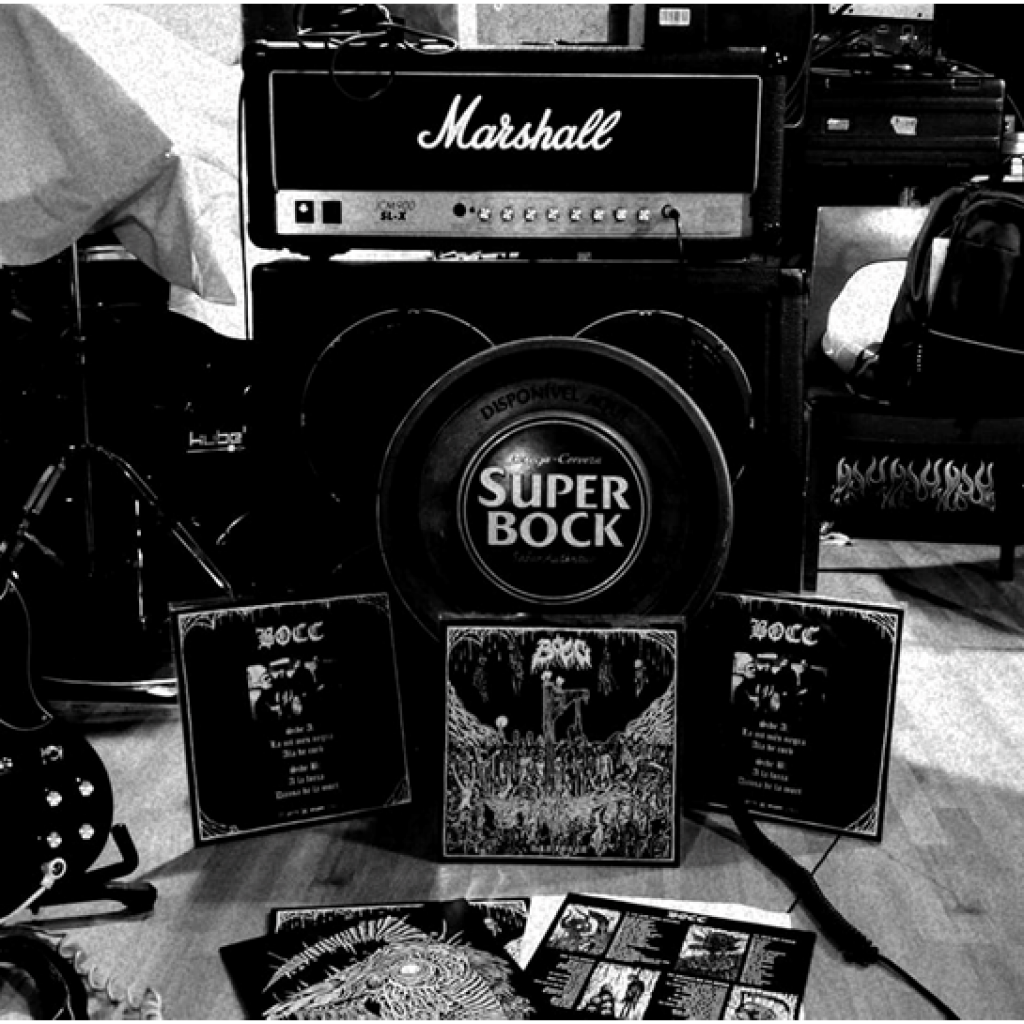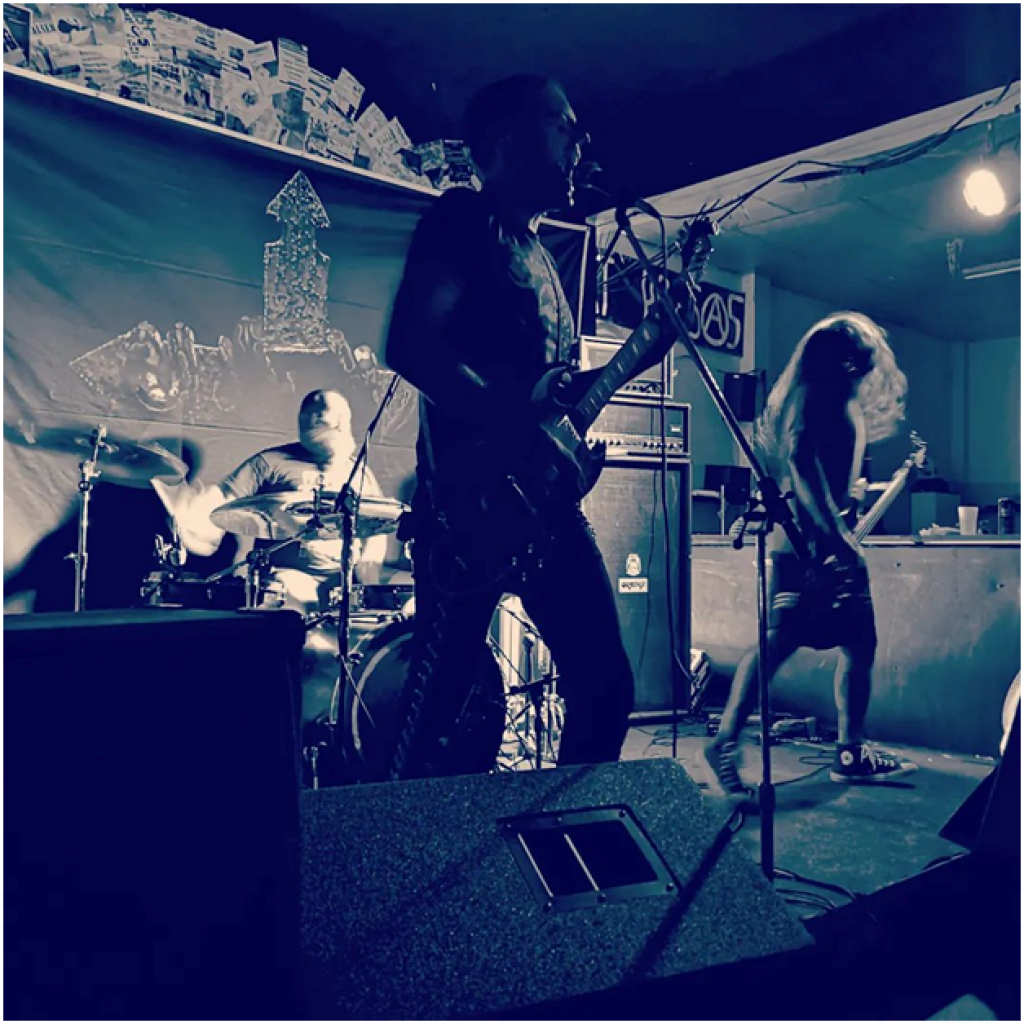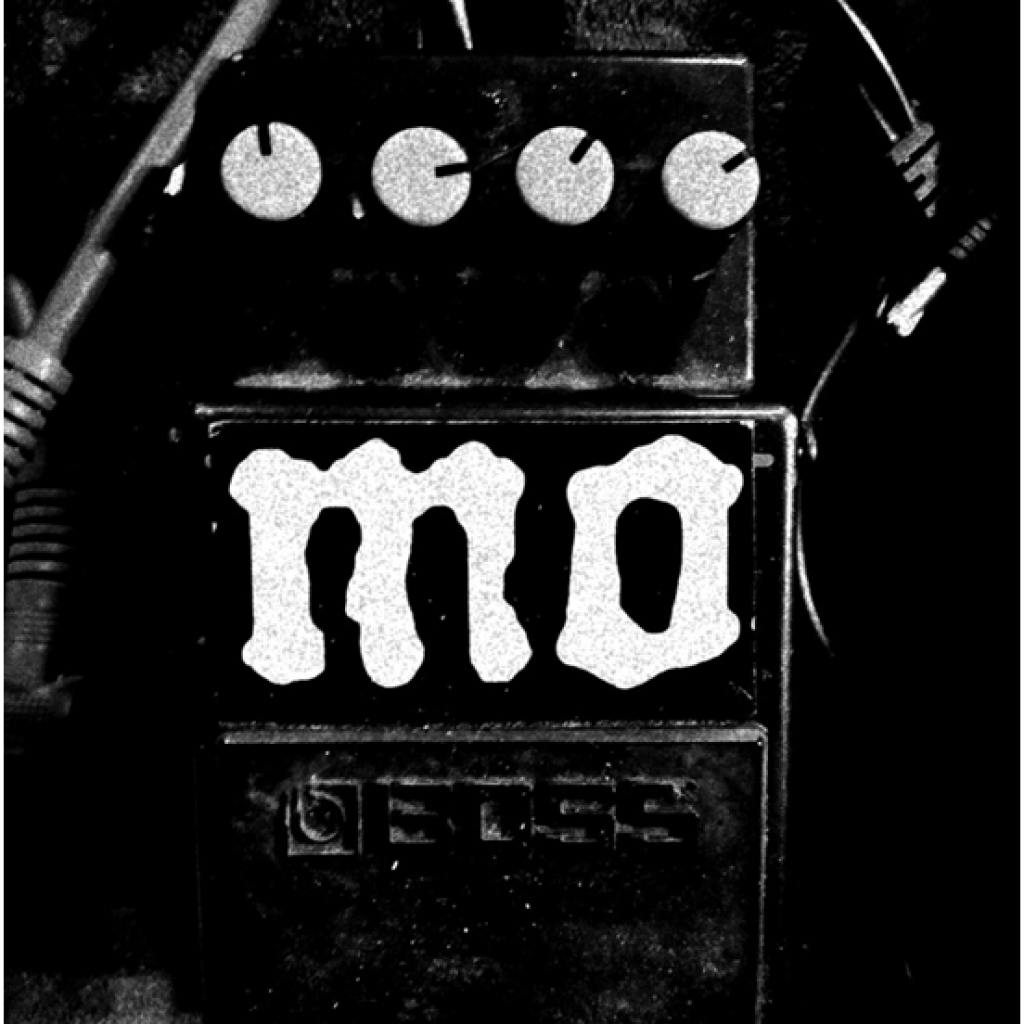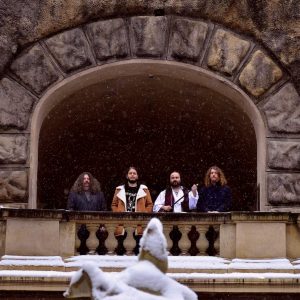BOCC
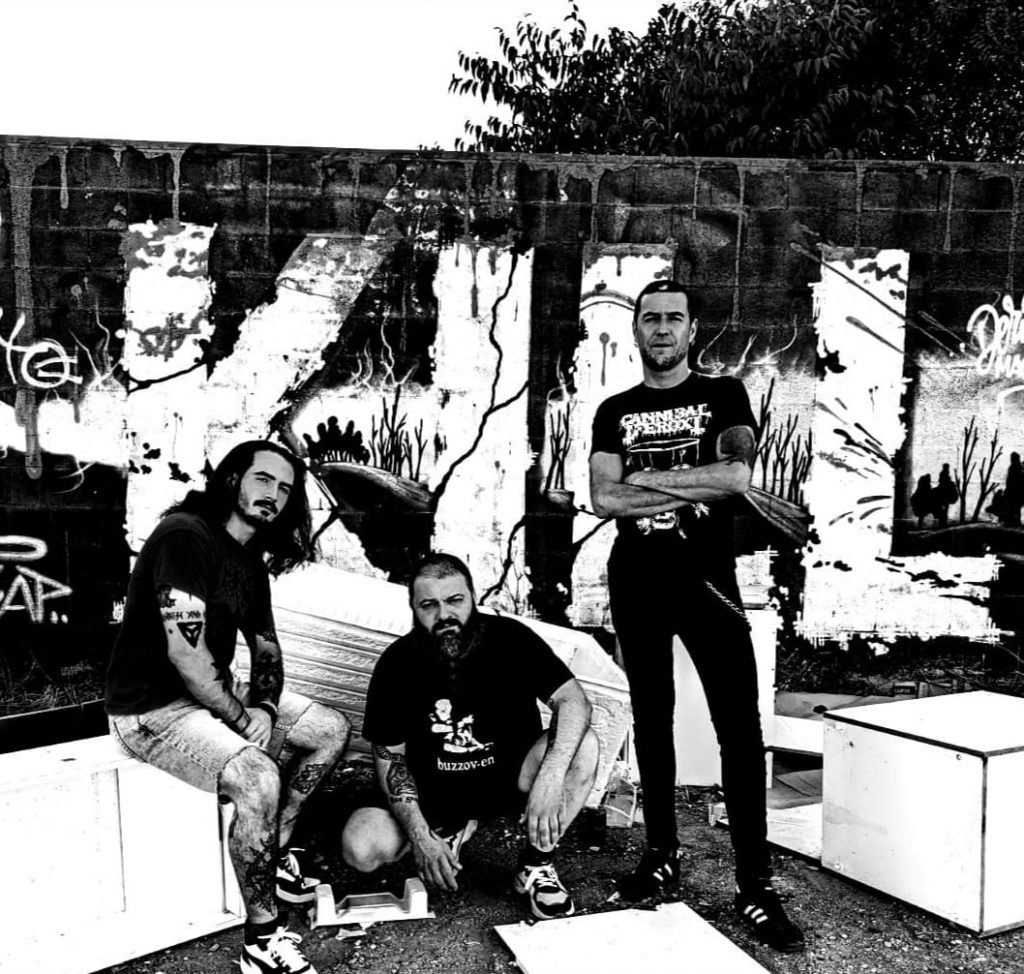
Hey Emilio! Let’s start with a kind of off-topic question about BOCC: why did you originally choose to do this interview in Italian?
Hi guys! First of all, thank you for interviewing us. The thing is that I lived in Rome for little more than a year (2001-2003) and I still remember how to write a bit of Italian. Particularly because I am very fond of comics (giallo and so on) and I still read Italian quite a bit
Did you have the opportunity to get to know and appreciate some Roman bands during your stay in the capital? Dirty Power Game, for example?
As I told you earlier, my stay in Rome happened so many years ago that some of it gets lost at the fringes of my memory, also because I’m talking about times in which the internet wasn’t the internet of today at all. I remember going to concerts in the Tiburtina area and at the Forte Prenestino… basically hardcore and hardcore metal bands, but I haven’t seen Dirty Power Game. By the way, I’m fan of Italian classics like Paul Chain, Death SS, Bulldozer… and I also like Forgotten Tomb and Doomraiser a lot (the latter from Rome, I think).
BOCC’s name comes from a beer type, doesn’t it? I understand that there’s a specific beer that inspired you to choose it as the band name. Super Bock? Tell us more about that beer and the name choice!
Hahahaha, noooo! Not at all, ‘’Boc’’ means ‘’(male) goat’’ in Catalan, our language. The thing is that we added a ‘’C’’ to it to make the name more metal, and also to not be the new Blue Oyster Cult. Now we’re the Blue Oyster Cult Cult. The beer thing is that – by pure chance – there’s this sign of the said beer (Superbock)where we rehearse and we took a photo to fool around a bit. There’s also the Boc DAMM whose emblem is a billy goat like ours. And I swear that we didn’t take it from there
The sound and writing in BOCC are clearly rooted in death-doom (Coffins being the most obvious, but I guess also Divine Eve, Winter, Grudge, Anatomia and so on), however, I hear some quite evident punk (or crust) contaminations as well.
Are you influenced by the British stenchcore scene too? Bands like Deviated Instinct, Axegrinder, Amebix, Sacrilege, Prophecy of Doom…?
Even in Japan, punk has produced somewhat similar bands… for instance Golem, Defiance, in a way Effigy, and a bunch of others that have more stench to their sound.
The first idea when we started the band was to make some sort of band à la Coffins (especially the ‘’Buried Death’’ album) which our ex-vocalist is very fond of. The thing is that both the others and I love Coffins, but also Autopsy, Winter, Undergang, Anatomia and many other bands. There’s also, as you said, a strong crust punk contamination (the kind which was played in Barcelona in the early 2000s, especially the band Horror) and a bit of sludge metal too (Iron Monkey, Eyehategod, etc.). It’s quite obvious that we like Amebix, Deviated Instinct and Axegrinder, but I don’t think they’re direct influences for BOCC.
Moreover, later on there has been a revival of that kind of sound that maybe brings you even closer to that stuff, with bands like Instinct of Survival, Sanctum and other bands more influenced by Bolt Thrower.
The Bolt Thrower influenceis absolutely there, especially from Charli, our bassist, but every one of us is a huge fan of the Brits… not just of the music, but also the aesthetic and the ethos of Bolt Thrower. In addition to that I’ll tell you that the new songs we’re composing right now are a lot more Bolt Thrower.
Explain to us how the band was born, what made you form it and which your main influences are.
Sergio (drummer) and I had talked about playing together for quite some time, to do something slow and morbid. He’s a big sludge doom fan and, for me, one of the best drummers to play this type of metal with. Besides, Xavi (our ex-vocalist as I told you earlier) had come back to living in Barcelona, after years living in Euskadi, and had the idea to form a band à la Coffins. Xavi talked with Sergio, Sergio with me and we decided to start playing together (starting off with a couple of ‘’songs’’ that Sergio and I had played a few times).Shortly afterward our bassist Charli joined, he was the ideal person for BOCC, him being a friend, a good musician and an absolute metalhead (once in a while, as a joke, we call him ‘’Charli Metallum’’).
Our influences are clear, the ones I’ve told you just before: Coffins, Autopsy, Disma and such, but always looking for the ‘’groove’’. We don’t want to be too doom, in that we want people to be able to ‘’dance’’ at our gigs, not by seeking speed, but rather an agonized groove and a little punk d-beat. There’s even sludge (speaking of sound and the waywe do the recordings, almost always live takes).
Speaking of which, those bands, are you still influenced by them to this day or did you choose over the years to lean more towards certain bands rather than others (or even to look for a more personal style of yours)?
They’re always there, but never or almost never do we write a song thinking ‘’this one’s gonna be Coffins’’ or ‘’this is gonna be Autopsy’’, apart from ‘’L’Altar’’ from the second EP ‘’Santa Eulàlia’’ that is an obvious tribute to ‘’Altars in Gore’’ by Coffins and to the Blues Brothers (if you listen carefully to the riff you’ll see that it’s totally Blues Brothers). Otherwise the riffs don’t write themselves, instead they come from practicing at home or in the rehearsal room. Every now and then, we come up with rhythmic patterns that we could use and that would sit well in the songs, that would add dynamics and sit well with the rest of the riffs, and that could bring variety to the songs. Ultimately, we think that when someone listens to an LP, he doesn’t want to listen to the same tune for 45 minutes. An LP should surprise the listener, otherwise you’d lose interest
Do external influences also contribute to the music and the essence of BOCC? Books, films, philosophy, politics, videogames, comics…?
There are always influences that are, let’s say, non-musical. In BOCC there’s a lot of folklore in the lyrics, and also history of Catalonia and of Barcelona, our city. We’re not a political band in the sense of making political claims with our words, but obviously we have an ethos and an aesthetic, as I was telling you earlier when we were talking about Bolt Thrower, and it shows in the places that we play in and in our attitudes towards the underground, machismo, fascism and lots more shit that affects us everyday
Tell us something about the themes, the imagery, the aesthetic and the lyrics of BOCC, and also about the very personal choice of writing in Catalan.
The lyrics are very influenced by the history and (horror or not) folk legends of Catalonia. For example, ‘’La Culla, 1923’’ from our second EP (Santa Eulàlia), tells the tale of a woman that killed her husband to enact justice (it’s a real fact); ‘’A la forca’’ from our first EP (A la Forca) tells stories of the gallows that were located on the outskirts and suburbs of our city, Barcelona, to kill those which society believed deserved death. Speaking of another song, “Dolça mort en els llims del Rec Comtal,” is the story of a drug overdose that happened in Barcelona, hence ‘’dolça mort’’ which is ‘’sweet death’’in Catalan
Your first full-length, »Dolça mort en els llims del Rec Comtal», just came out. In my opinion, it’s your most personal record in which you’ve truly found the vibe that makes BOCC what it is, both compositionally and sound-wise.
I’d like to hear in your words what you think of it, what’s changed compared to the previous releases and how you’d present the record (as some sort of introduction to the band) to someone who’s never heard of you.
After 3 years of playing together and having gained experience as a band, this time we knewvery clearly what we wanted in terms of composition and sound. Plus, all the songs have been composed over a period of a year and a bit, and there’s no song that was been put on the LP for its own sake: they all have their meaning and their position… their place, so to speak. Compared to the previous releases, the change is obvious because we’re talking about an LP, not an EP… everything is more thought-out, and we also took more time in the studio (not a lot more, but a bit more). Then we assigned the mastering and the mix to Javi Félez of Moontower Studios (Teitanblood, Balmog, Cruz, Graveyard, among lots of others) and we think that the results are very good. Anyway, it’s just our first LP and it’s been recorded in a record time of four days plus three for the mix and master, but it’s also due to time and money. We hope we’ll be able to spend a little bit more time on the next one
Often ignored or overlooked, but how important do you think lyrics are in extreme music?
Lyrics are always important, even though they can be hard to understand sometimes in extreme music, but they’re important to us. And this time, for reasons related to the vinyl pressing of the LP, the lyrics won’t appear in the LP insert. It was a conscious decision and we eventually decided to highlight other aspects of the project
Will the vinyl press of »Dolça mort en els llims del Rec Comtal» also have English translations of the lyrics? It would make them accessible to whoever might obsess over the band. I’d be very curious to read them, for instance.
The lyrics, as I said earlier, won’t be put in the vinyl press, but we might publish them on Bandcamp in Catalan and translated into English. We have to think about it. Maybe for a more internationally placed reissue (USA) it’d make sense to have the lyrics.
By the way, I see that both »Dolça mort en els llims del Rec Comtal» and ‘’Santa Eulàlia’’ could be considered concept albums.
One about gender equality, while the latest one is even dedicated to your ‘’dead’’ city, Barcelona.
Elaborate on these themes, both from a social perspective and regarding their inclusion in your music.
‘’Santa Eulàlia’’ isn’t a conceptual EP. It’s dedicated to the figure of Santa Eulàlia, not as a Christian icon, but more as a representation of a woman that struggled against injustice in a world of power. Power, regrettably, is almost always in the hands of males, but it’s not a conceptual EP, because every song talks about a different thing.
On the contrary, “Dolça mort” is indeed a conceptual LP, because it talks about a world of different addictions that have a common scenario, Barcelona (all songs but one, “L’ombra del vampir”, the setting of which is L’Empordà, in the north of Catalonia). All the songs talk about addictions that existed and exist in our city, from religions (‘’13 Calzes’’), to sex (“Caça major”, “L’ombra del vampir”), and drugs (“Dolça mort” o “Et creixen les ungles”).
What’s the reason behind the palette change (from the greyish of unspoiled black and white, to black and white and red) that feature on your latest record?
We wanted to have differences between the EPs and the LP, hence the change in the colour palette. Though it was very important to respect Narcís Boter’s (our illustrator) way of working, and he always uses black and white. So we thought that placing the logo of BOCC in the upper right corner, and using blood red, was a good choice.
Tell us the story of Saint Eulàlia and the reason why you chose to make her an icon of gender struggles.
The story tells that Santa Eulàlia was a Christian martyr that rebelled against the power of the roman governor Dacian, in the 2nd century. The governor, faced with Santa Eulàlia’s refusal to renounce her faith, sentenced her to a 13-fold martyrdom, Eulàlia’s age at the time. We talk about Eulàlia as a symbol of a young woman’s struggle against a world ruled by men, not as a Christian saint, because Christians… we are not at all.
What is your opinion of contemporary Spain and of Catalonia?
Two lost countries, as the rest of Europe and the world, I’d say. Honestly (it must have something to do with age, I think), my idea of Spain is by no means a positive one, and neither is my idea of Catalonia.
What impressed you and stuck with you the most about Rome, both positively and negatively, and both as a city in general and compared to Barcelona?
Rome is a wonderful city for many things. Architecture, art, people, food. I have a special memory of the art house cinemas (in which I became very fond of Pasolini’s cinema) and of the libraries. I think it’s an amazing city to read and buy comics (I became very fond of Dylan Dog and Dampyr, among others)
It just takes a brief look at Metallum to see that you’ve all been in several other bands before BOCC.
Tell us more about those which you consider the best bands of each one of you (yourself included, of course) and why they are the best. And what makes BOCC different from the others, from your point of view.
Sergio has been the drummer of one of the most influential sludge bands in Spain (Lords of Bukkake), which were really good (listen to the LP ‘’Desorden y rencor’’ and you’ll see that I’m not talking nonsense).
Charli plays the guitar in the band Guillotina, they play some sort of death/thrash with more and more Bolt Thrower. They’re great friends and good musicians.
I played in A Tomba Oberta (bass and vocals), a veteran death metal band à la Grave/Autopsy (we don’t play anymore now but our second LP has just been repressed by Reek of Records and it can be found on Spotify and so on), and I also play in Landing Zone… we play thrash/crust and we’re about to release our first EP.
Recently, your old vocalist (Xavier) left the band.
When I saw you live I was very curious to see how you’d replicate such rotten vocals after changing vocalists.
Did you adapt to the ‘’BOCC style’’ or is it a coincidence that you’ve got a timbre that similar?
As I said earlier, I sang in a death metal band before, so I’ve got some experience with singing in those registers. Anyway, with BOCC, I tried to go lower, especially trying to go for deeper and do more gravelly guttural vocals. Xavi had a range I may not have (black metal screams, for example), but I think that I can bring other things to the table. I’m very interested in vocalists à la Gorefest, Incantation (the first albums), Grave… and I want to try going lower with the growls.
I saw a few photos from the recording sessions for ‘’A la Forca’’, one with an HM-2 and the other one with a Marshall, which makes me think that you recorded your debut with that stuff. Today, instead, you just use head distortion (not the Marshall anymore, by the way). What is it that pushed you to change equipment and ditch the HM-2? And do you think that could’ve helped in finding the more personal sound you’ve got in your latest album?
In ‘’A la Forca’’ I used an HM-2 to push the distortion of the Marshall a little bit, but it was by no means used like Dismember or Entombed, the classic sound of the HM-2. I like it, but today the bands that emulate that sound are so many that, frankly, it tires me quite a bit. By the way, I’ve been using two amplifiers since ‘’Santa Eulàlia’’ (the Marshall and a Laney). No distortion pedals, just the amp gain. It’s always a good choice if you have good amplifiers, of course.
I seem to understand that you’ve got a certain passion for the noisier and improvised or accidental sides of extreme music. Live, you open shows with feedback, dissonance and various noises. Even between and during songs you sometimes let yourself go with feedback, brief dissonant improvisations, etc.
Are there bands and/or scenes in particular that influence this side of BOCC (and I suppose of your guitar playing style), or does it all boil down to absurd amounts of gain and the spontaneity that characterizes punk?
I’ve always been a big fan of the feedback that comes from amps with absurd amounts of gain, as you put it. Obviously there are influences, from Jimi Hendrix to The Stooges, Sleep, Monster Magnet, Iron Monkey and, you know, all the doom, sludge and also sounds like drone and so on. I really like it a lot, blending all this noise in with death metal.
Sum up your approach to music and your mentality as a band in 7 words.
When playing, you must play for yourself.
Which do you think are the best, past and present, Catalan bands (regardless of genre)?
For me, without any doubt, they are Tort (the best sludge doom band from Catalonia and even Spain), Cruz (who play some Dismember-style death metal but with blackened stuff) and Atonement (thrash, speed, crust from hell!)
Are there any bands that influence BOCC that nobody would expect? And bands that you enjoy that don’t belong to the worlds of punk and metal/rock?
I don’t know if anyone would expect it or not, but we do have industrial influences from early Pitchshifter or Godflesh, and also from ZZ Top (we have a pending cover). Basically I listen to rock/metal/punk but I also enjoy stuff like HIP HOP/RAP.
Both in Italy and in Spain there’s this sort of division between the punk and the metal scene. Who sees them as two sides of the same coin is always kind of the black sheep and often finds himself in the middle of ethical/political debates about what punk should (or shouldn’t) be and what the metal scene, sadly, often is.
How do you and the rest of BOCC live this division and what do you think about it (both musically and socio-politically)? Should they stay separated or should there be more hybridization, both musical and of spaces, ideas, etc.?
I think that in Spain this division that you’re talking about doesn’t exist anymore (thankfully). It is very common to have gigs with punk/HC bands together with metal bands, and also people that move freely and comfortably between the two genres. Charli occasionally plays in the punk band ‘’Navajas automáticas’’ and I have a crust/thrash/stenchcore project named ‘’Landing zone’’.
You do have a vinyl repress of ‘’A la Forca’’, do you?
If any label would be interested we’d be flattered to have a repress of ‘’A la Forca’’, but we can’t do it ourselves. Vinyl issues are unfortunately too expensive, indeed.
What does BOCC’s future hold? A few splits? A European mini-tour?
BOCC’s future holds a few things. First, playing as much as possible in Spain and southern France (for proximity reasons). Then, there’s also the idea of releasing a split with two songs we have from the ‘’Santa Eulàlia’’ recording sessions… we hope to do it during 2023 with the death/funeral doom band God’s Funeral. A mini-tour would be nice, but we’d have to adjust our personal lives and that of the band accordingly, and it isn’t easy at all. Who knows, hopefully we can have the interest of some metal festival in Europe and then be able to organize a little mini-tour. If you know about any festival in Italy we’d be glad to have a chance to go there, of course!
Thanks a lot for your time and for having replied to our questions! End the interview as you like, anything you want to say, say it!
Thank YOU! It was the most profound interview they’ve ever done us! Cheers and lots of death metal!
